 WEBER LOOKING FOR THE GUY IN CHARGE
WEBER LOOKING FOR THE GUY IN CHARGE
After Northwestern’s triumph Saturday, Coach Weber marched into the Illini locker room. He observed no vocal guidance. Illinois’ players weren’t talking.
Directors of organizations might be peeved, upon entering a meeting room, to find subordinate members not hushing up. Not Bruce Weber.
That’s because Weber is as curious as the players: Who commands and directs this team?
The identity of the guy in charge is especially important this year, because whoever it is, he’s doing a shitty job. When Weber finds out who’s responsible for all this mess, you can bet he’s going to give that guy a piece of his mind.
Here are some of the things Bruce Weber would like to see changed:
No one is leading the group: “Somebody’s gotta take this team and go with it.”
No one knows who’s responsible for directing the offense: “You need somebody to make a shot, to make a play.”
Tyler Griffey doesn’t get enough playing time: “Tyler .. I feel bad ’cause he deserves to play.”
You can hear all of these thoughts in this uncut MP3 of Weber’s post-Northwestern tua culpa. In summary: It’s the players’ fault.
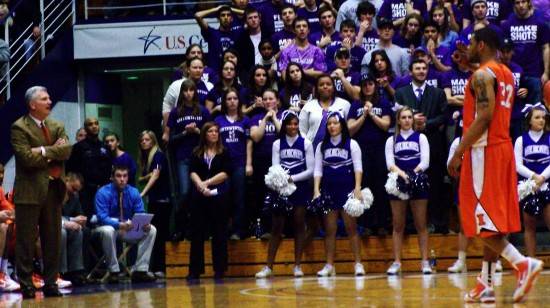
DIAGRAMMING BRUCE WEBER
If this Illini team had someone in a position of authority, someone who could parcel out playing time more effectively, someone who could draw up plays, and direct individuals to take shots, then Bruce Weber would be happy.
But who?
We learned in 2006 that Weber himself is willing to give directions, almost throughout an entire game. The Illini Radio Network audience particularly noticed, because Weber stands within five feet of Ed Bond’s microphones.
When asked, Weber explained the reason you never heard him in 2005. That team didn’t need any instruction. They knew what to do.
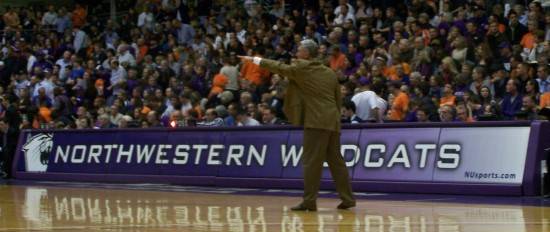 Bruce Weber points at somebody, and yells something.
Bruce Weber points at somebody, and yells something.
So what’s he yelling?
Well, in order to understand Weber’s linguistics, it’s important to determine how each word or sound operates as language.
I’m a second-rate grammarian. I don’t really understand some of the finer points of syntax and linguistic modalities. But my mother was an English professor, and I got a B in 8th grade grammar. So I’ll give it a shot.
“Move!” and “motion!” are typical Weber admonitions. “Screeeeeen!” comes up frequently. These are all simple imperatives. Everyone should understand the general idea behind these commands, whether (like the players) they aren’t sure how to apply them.
No big deal, so far.
But often Weber just yells a player’s name. This ululation can be especially confusing to the guys on the floor, because the one word implies either of two grammatical moods.
Let’s have a look.
For this exercise, I’ll use the example of Weber’s loudest, most common ululation: “Tisdale!”
In some cases Tisdale means “you (four guys) get the ball to Tisdale, who is open.” The mood structure is second person plural imperative. Tisdale is the indirect object.
Tisdale can also be the subject in third person present indicative without changing the purpose of the exclamation. It means simply “Tisdale is open,” but merely as an observation rather than a command to take action in response to Tisdale’s openness.
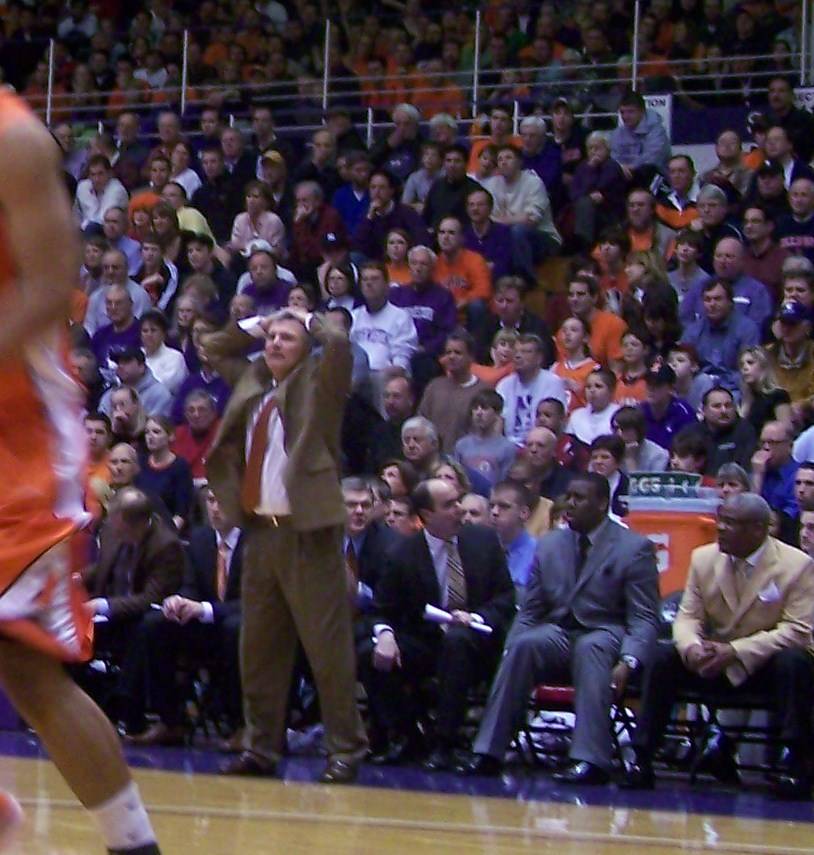
With me so far? I hope so. That’s the easy part.
The hard part is when Tisdale is the subject. This situation occurs when Tisdale means “pay attention Tisdale, there is something you are not seeing!”
In this wise, the mood structure is second person singular imperative. Tisdale becomes the subject, but — as you’ve no doubt already spotted — there’s a subordinating subject lurking in the second clause. (It’s really two distinct sentences, see.)
At this point, Mike must determine the identity of that second subject: What is it that Tisdale does not see?
The answer might be a screen he’s not setting. It could be a cut he’s not making. It might be a pass he’s failing to bounce.
The options may seem overwhelming. But the first step is to determine that Tisdale is an imperative ejaculation, and not merely observational.
(We stipulate here that Weber believes his team recognizes Tisdale by sight, and knows when Mike’s on the floor. Therefore we must infer that Tisdale means something more than “look, it’s your old friend Mike Tisdale.”)
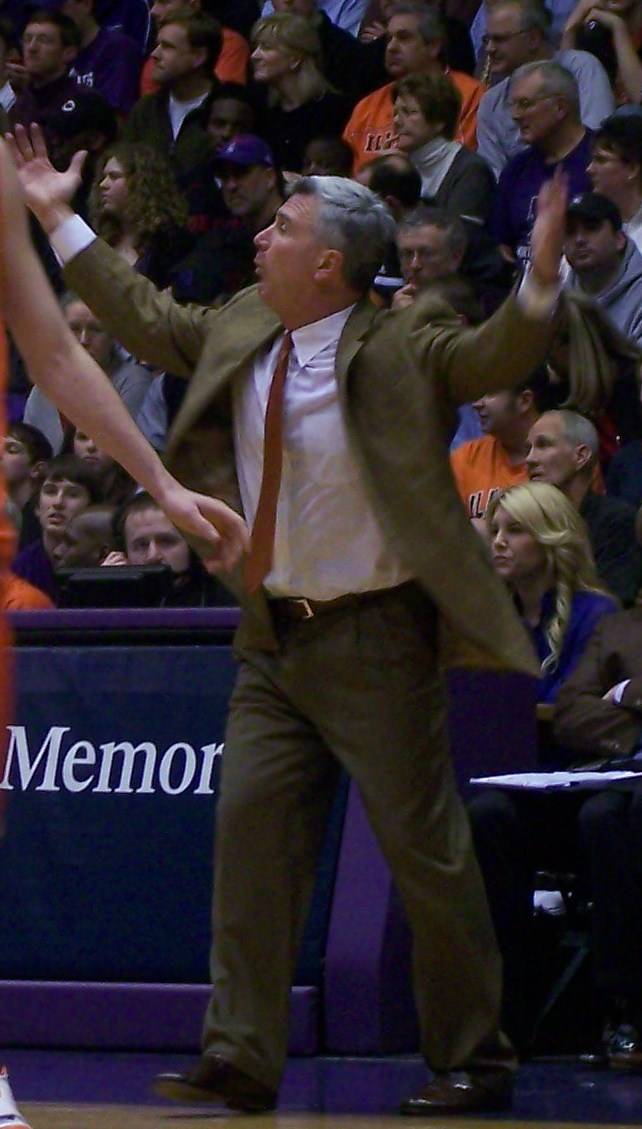
It’s at this fleeting moment that Tisdale — or whichever player hears his name reverberating in the rafters — faces an existential crisis: I know who I am. I know I am playing basketball. Now I must determine the way in which I am playing basketball incorrectly.
Only it’s too late, because the other team now has the ball and is closing in on a lay-up at the other end.
To his credit, Weber rarely employs the subjunctive mood. That’s good, because no one ever really grasps the subjunctive.
THE SUBJUNCTIVE MOOD
Maybe Weber avoids the subjunctive mood because it has dire implications.
If Illinois went a sixth straight year without winning a single NCAA Tournament game, people might start grumbling.
and
I am mapping out some set plays, so my team will know what to do.
or
If Lon Kruger were still here, this team would be challenging for a conference championship.
Because of poor communication, Bruce Weber has lost the team.
I’m not saying they’ve stopped taking him seriously. I don’t think that’s true. I’m saying they don’t know what the fuck he’s talking about.
Weber wants them to “buy in” to his system, which means they learn to see for themselves the movement, the flow, the spacing, the intensity.
Weber noted (again) that he’d seen this coming. He saw it in the pre-season, and he saw it in the pre-conference season. He knew it was coming. If only he could have found that guy in charge, maybe he could have done something about it.
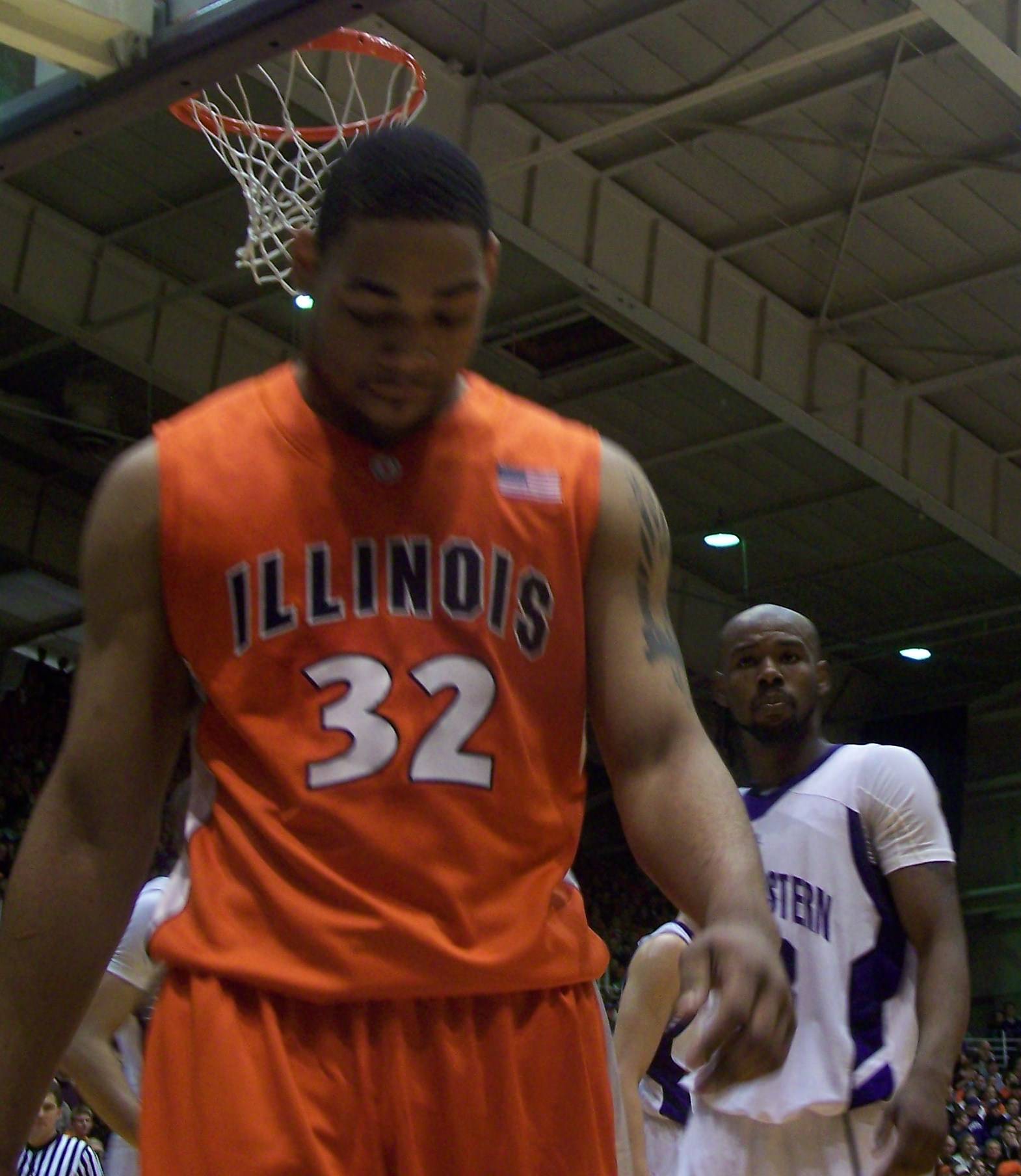
Bruce Weber is extremely well-suited to coaching four-year players who’ll spend 3 years on the sidelines watching, waiting, learning. He started two freshmen guards for most of this season, perhaps because he hoped to show willing.
But freshmen need directions — before the game starts — in complete, comprehensible sentences.
You remember that low-post back screen that freed DJ to curl around the lane, and hit the go-ahead jumper at Indiana? You remember Bill Cole hitting that same jumper, on that same play, from the same spot against Purdue?
These were not accidents. They were the result of planning.
BIG TEN TOURNAMENT: A TRADITION OF FORGIVENESS
As the media waited and waited for Bruce Weber’s postmortem, I asked one of the newspaper guys “do you need a winning record to play in the CBI?”
“No,” he immediately answered. “The sad thing is I’ve already researched that.”

Packed in the sardines can of a press closet — along with myriad sweaty journalists — was LaTonya Sadler, men’s basketball SID for the Big Ten Conference. Her presence reminded everyone that all eleven Big Ten teams might redeem themselves on the second weekend in March.
You see, the time to panic has passed. The time to hope for outrageous luck is upon us! Whether the Illini become Penn State’s first conference victim; whether Indiana Creans us on our own home court; we still have a shot at the NCAAs. If Illinois wins four games in four days, it could become the first 14-seed in conference history.
Whatever the critics say, Illinois is arguably still one of the top five teams in Illinois.
COOMES IN DA HOUSE

Longtime Lou Henson associate Mark Coomes is now retired from coaching. He watched Saturday’s game with his son Anthony, a former Champaign Central standout.
At halftime, Mark Coomes observed that Illinois hadn’t taken full advantage of Michael “Juice” Thompson’s foul trouble. It was an eerie oracle of things to come.








